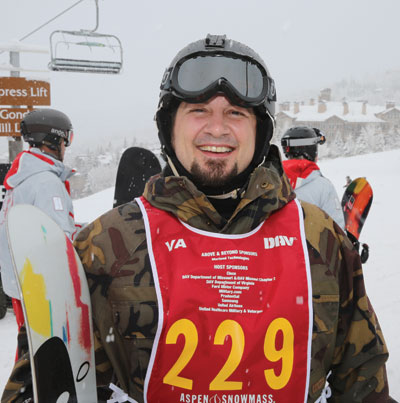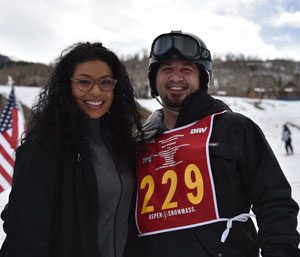Disabled veteran Adam Greathouse receives DAV Victories for Veterans Award.
 Disabled Army veteran Adam Greathouse was recently selected by DAV to receive the DAV Victories for Veterans Award and will be recognized on-stage at the Carolina Country Music Festival in Myrtle Beach, South Carolina, June 9.
Disabled Army veteran Adam Greathouse was recently selected by DAV to receive the DAV Victories for Veterans Award and will be recognized on-stage at the Carolina Country Music Festival in Myrtle Beach, South Carolina, June 9.
The festival is scheduled for June 8 – 11.
Greathouse was also named the 2017 DAV Freedom Award recipient at the 31st annual National Disabled Veterans Winter Sports Clinic (NDVWSC) in Snowmass, Colorado.
The West Virginia native suffered a severe traumatic brain injury and major damage to his lungs and other internal organs while deployed to Kosovo in the Balkan Peninsula.
“I had hoses in my left lung, my right lung was suffering other conditions at the time, they had chest tubes in … they tried to save [my left lung],” he said. “I lost the left one. My right lung has scar tissue and at the time I had an enlarged heart from all of this and all of my organs were trying to shut down.”
The soldier suspects he had somehow come in contact with some residual chemical weapons left over from the Albanian/Serb conflict during the war in Kosovo, which lasted from May 1998 to June 1999.
He was in a coma for two months.
When he woke up he was down to 110 pounds, could not move, had a breathing tube and was on life support.
The mortality rate for injures like his are 98 percent. A flag was sent home to his mother’s house to be draped over his coffin and a warrant officer was dispatched to escort his body home.
But he pulled through, but barely.
Greathouse was eventually discharged after a lengthy stay at Walter Reed Army Medical Center. He returned home to his parents’ house.
“I just stayed in the room, as dark as possible, no music, no TV, I hardly ate. I went into a very deep depression,” said Greathouse. “Along with the brain injury, I had to learn how to write and walk again.
“I felt like I was a burden and just existing. That’s when I started contemplating taking my own life,” he said.
Greathouse, during that period, described himself as “a walking stick of dynamite.”
“When I came back after my injury from serving in the Army, I was bitter, I was angry, I really hated myself and everything else,” Greathouse said. “I hated life.”


He felt he was a failure as a son, a man, a father and a soldier, he said.
“I self-medicated daily,” he said. “With alcohol. Large amounts.”
Greathouse said he was just getting by day-to-day and didn’t know what day he would “check-out.”
“But it would’ve been by my own hands,” he said. “That’s horrible to say because life is precious but that’s where I was at.”
At his lowest point, he found himself sleeping in his truck in empty parking lots.
Greathouse’s mother repeatedly tried to persuade him to seek the help of his local VA Medical Center and after several tries, he finally relented.
“I went because my mother asked me,” he said. “I didn’t like it at all and then I found out about the [recreation] program and really wasn’t excited about it either.
“I just didn’t want to be around anybody. I was a real recluse for about 10 years.”
Greathouse eventually began recreational therapy and attended his first NDVWSC in 2012.
“We came here to the winter sports clinic in Snowmass, [Colorado,] and my life changed forever,” he said. “I took all the stuff I’ve learned at the winter sports clinic and I’ve taken it home and applied it to my own recovery process.”
One of the paramount miracles Greathouse says the mountain in Snowmass has given him is a changed relationship with his three children.
“I forgot a lot of stuff,” he said of commitments he’d made as a father. “I was always late.
“When they were a little bit younger, I don’t think they were disappointed, they just thought, ‘Oh, that’s just how dad is.’”
But after his first winter sports clinic, he returned home energized with what he calls “this permanent smile and a new motivation for life.”
“I take [my children] kayaking and snowboarding,” he said. “I’m active. I don’t just sit at home. I’m active and take them with me.”
Taking his own recovery a step further, Greathouse also brought his experiences at the clinic home to share with fellow ill and injured veterans.
“They’re not here and they’re not getting to experience this,” he said. “But that doesn’t mean that they’re left behind because I’m there to help them.”
Greathouse takes his personal mission of giving back to fellow disabled veterans seriously.
“He would drive two hours to come here, even on days when he wasn’t scheduled,” said Deborah Brammer, Huntington Veterans Affairs Medical Center public affairs officer. “He’s all over the medical center, helping veterans get to where they need to be, pushing wheelchairs and he always has a smile on his face.
“I’ve even seen him stay very late just to sit with a spouse in the waiting room while the veteran is being seen,” Brammer said.
In addition to being a constant fixture at his local VAMC, Greathouse has taken an active role in ensuring fellow veterans get help when needed.
“When I give [veterans] my business card, I’m 24/7,” he said. “I know that when I was in the process of going through the system that if someone I should have been able to count on said there were going to be there and they didn’t show up then I would know the whole system failed and I would’ve never come back.
“I’m not going to let that happen. I feel that would be on me; that I would’ve let a veteran become a statistic so I walk the line. If I talk it; I walk it. I’m there for them 150 percent all the way through from the beginning to the end,” said Greathouse.
But he will be the first to say he’s not a hero.
“I’m just a regular guy that went through what he had to go through to survive and I was in survival mode for a real long time,” he said. “Now, after the winter sports clinic, I just go every single day as hard as I can and enjoy life.”
